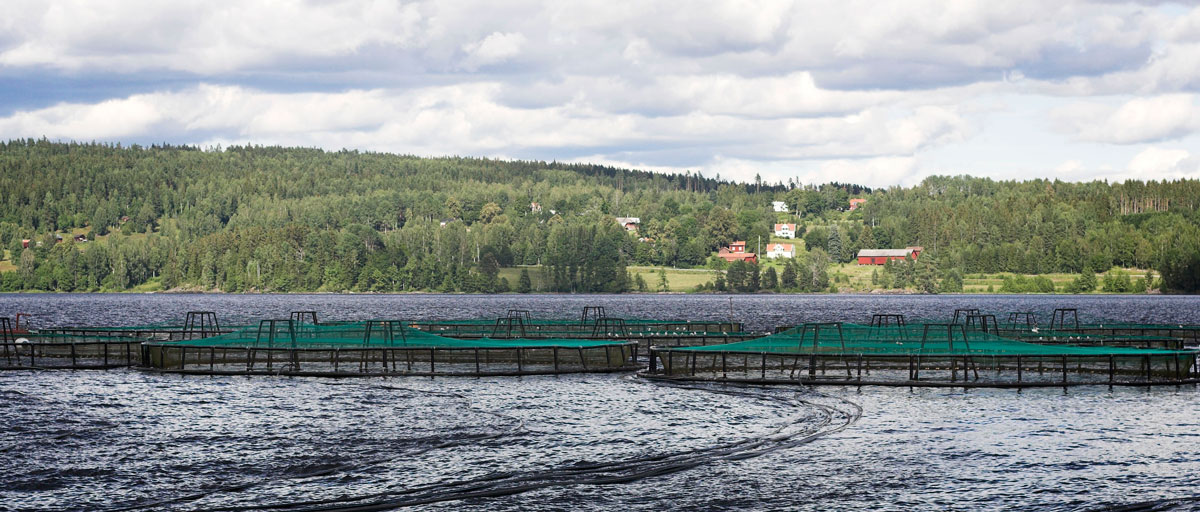
Researchers at Stockholm Resilience Centre and the Beijer Institute for Ecological Economics have been granted SEK 10 million by the Swedish research council Formas for research on how to sustainably increase production and consumption of seafood in Sweden. Photo: A. Tedeholm/Azote
Bildtext får vara max två rader text. Hela texten ska högerjusteras om den bara ska innehålla fotobyline! Photo: B. Christensen/Azote
research funding
Healthy but what about sustainable?
New grant from Formas will fund research on how to sustainably increase production and consumption of seafood in Sweden
- Formas funds research on how to sustainably increase production and consumption of seafood in Sweden
- SEACHANGE will look at environmental preformance of innovative aquaculture methods
- The project will also look at consumer behaviour in relation to sustainable seafood
Max Troell, Patrik Henriksson, Malin Jonell and Therese Lindahl, researchers at the centre and the Beijer Institute, have been granted SEK 10 million in funding by the Swedish research council Formas for research on how to sustainably increase production and consumption of seafood in Sweden.
Producing healthy food for a growing world population without increasing the pressure on the planet’s ecosystems is one of the greatest challenges of our time.
Seafood could play an increasingly important role for global food supply since it is both healthy and comparatively resource efficient to produce.
At the same time, capture fisheries and aquaculture production can cause harm to the environment, for example through the use of damaging fishing gear or the overuse of antibiotics in fish farms.
“These are problems that need to be addressed if the seafood sector is to reach its full potential,” says project leader Max Troell.
Within the new project, SEACHANGE, the reseachers aim to investigate the environmental performance of some innovative Swedish aquaculture methods.
"We will look at for instance farms that integrate aquaculture and agriculture, growing their own fish feed and using byproducts from the aquaculture on the fields. Or closed recirculating systems where the seafood is grown on tanks on land," Troell explains.
"We will quantify impacts such as greenhouse gas emission, nutrient emission, acidification and land-use,” he continues. Project partners in Gothenburg and Canada will also study fishing practices aimed to minimize bycatch.
How to change habits
In addition to the environemental performance, the interdisciplinary team of researchers will also look at what drives or hinders people to eat more sustainable and healthy seafood. With experimental behavioural studies they will explore what makes customers choose sustainable alternatives and study what role eco-certification, for example MSC, ASC and similar labels, as well as policy measures play.
The project will team up with public and private partners to maximize the value of the research for society. The findings generated will be used to improve existing sea food guides, aimed at consumers, retailers and producers, such as the one produced by project partner WWF.
Although the project has a Swedish focus, the researchers see it having a broader impact:
“Increased knowledge on effective mechanisms in improving the environmental performance of fisheries and aquaculture will be of great importance for stimulating change, both in Sweden and globally,” concludes project team member Patrik Henriksson, researcher at the centre and the Beijer Institute.
Max Troell is Associate professor and Senior researcher at the centre and at the Beijer Institute for Ecological Economics. His work focuses on inter-linkages between aquaculture and fisheries on different spatial scales.
Project partners in SEACHANGE
Stockholm Resilience Centre
The Beijer Institute of Ecological Economics
SP Technical Research Institute of Sweden
Collaborators






